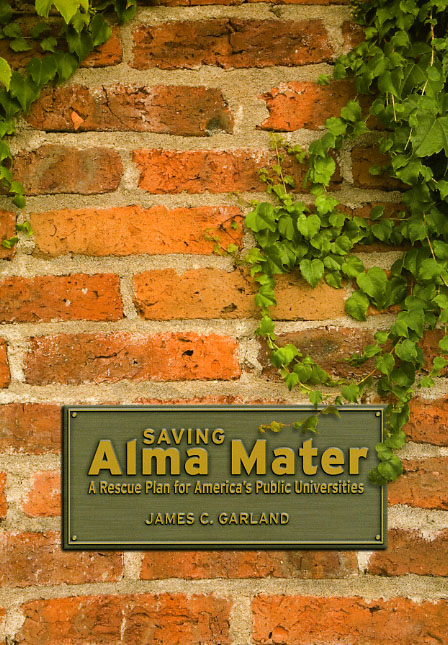A Rescue Plan for America’s Public Universities

As Patricia Cohen recently wrote in the New York Times reviewing two new books on higher education, “champions of the market can turn up in the oddest places. At the same time that bankers and businessmen are acknowledging the downsides of unregulated capitalism, college and university reformers are urging the academy to more closely embrace the marketplace.” And one of the reformers Cohen reviews is our author.
In Saving Alma Mater: A Rescue Plan for America’s Public Universities James C. Garland draws on more than thirty years of experience as a professor, administrator, and university president to argue that a new compact between state government and public universities is needed to make these schools more affordable and financially secure. As Cohen writes:
Mr. Garland is concerned with putting public university systems on a solid financial footing. Although they educate 80 percent of the nation’s college students, public institutions have seen their quality sapped by shrinking government aid, changing demographics and growing income inequality. In Saving Alma Mater, Mr. Garland argues that government should end subsidies altogether and allow supply and demand to rule. Let public universities compete for students and set their own tuitions. To ensure that poor students can afford to attend, legislatures should eliminate institutional financing and instead use that money for financial aid to individuals. In essence, he proposes a voucher system.…
Mr. Garland also wants to bring some market discipline to the culture of academia. While professors tend to be progressives, they are stubbornly conservative when it comes to change. Indeed, as Mr. Menand points out, early reformers argued that the only way to elevate excellence above profits in a capitalist society was by protecting the profession from the market’s insistence on cash rewards.
The result, Mr. Garland maintains, is that professors are oblivious to the costs of complex procedures, drawn-out debates and layers of committees; appeals to increase efficiency and productivity are routinely scorned.
For more about Garland’s take on financial reform in public universities read Cohen’s complete review on the NYT website. Or check out the following links for a debate we hosted right here on the blog several weeks back when we invited Garland, and another of our authors, Gaye Tuchman—whose book Wannabe U: Inside the Corporate University presents a formidable counterpoint—to dialogue on the issue.
Part 1
Part 2
Also read an excerpt from Garland’s book and see the author’s blog.